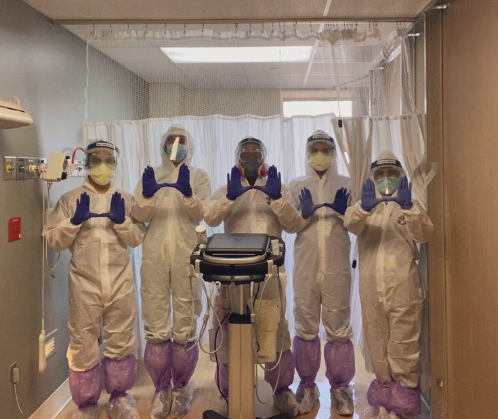Innovation
Active resident participation in program innovation is an important and vital part of our program. Resident driven innovations that have been adopted in the last few years include Block Scheduling on both Medicine and Pediatrics, our Pediatric Academic Half Day, the Internal Medicine Inpatient and Outpatient Academic Half Days, our intern Med-Peds ambulatory rotation and a noon conference lecture series led by Med-Peds residents. Our curriculum is designed to offer residents over 12 blocks of elective time. This allows for ample innovation of curriculum and ample time for career development. With the guidance of our program leadership, residents have been allowed to design elective rotations suited for their individual career development. Examples include the Global Health Readiness Elective and the Pediatric Procedure Elective. A Med-Peds resident was also the first to pursue the Urban Health Track.
tRANSITION MEDICINE
The UM/Jackson Med-Peds program is a leader in providing transitional care services for adolescents and young adult patients with chronic conditions of childhood. The Med-Peds clinic is a transitional care referral site for this patient population and residents are the primary care physicians for patients with special health care needs. In addition, Dr. Tolentino, Dr. Imm, and Dr. Saxena are involved in the Lifespan Interprofessional Collaborative at the Mailman Center for Childhood Development focused on developing new models in the University of Miami Health System to ease the transition of complex adult patients through innovative care models and new care networks. Dr. Tolentino and Dr. Saxena recently opened the new PATH Clinic designed to provide transitional care services for pediatric patients transitioning to adult care using an innovative telemedicine-based multidisciplinary model to provide coordinated care to young adults in the South Florida community. Several of our residents are involved in the planning and development of initiatives within the Lifespan IPC collaborative. Additionally, Dr. Tolentino serves as the primary care provider in the multidisciplinary Spina Bifida Clinic at Jackson. Other transition experiences are also available through the Sickle Cell Program, Cystic Fibrosis Program, and Adult Genetics program. Curricula focused on the principles of effective transitions are integrated into our ambulatory rotations and core didactic curriculum and the residency program continues to explore new clinical and curricular opportunities for the Med-Peds residents.
Special Rotations
Procedure team
In conjunction with the UM/JMH Center for Patient Safety, we participate in a novel patient safety and educational initiative: the Procedure Team. This monthly rotation enlists 2nd and 3rd-year residents to participate in a 2-day sim-lab experience, during which residents learn invasive bedside procedures including paracentesis, thoracentesis, lumbar puncture and central line placement. Residents are taught by a team of multi-disciplinary faculty in our UM-JMH Center for Patient Safety. The residents then spend 4 weeks on the hospital Procedure Team, a consulting service that performs these procedures full-time under direct faculty supervision.
Healthcare Administration
This two-week elective provides residents with the knowledge and skills essential to bridge clinical practice and management. With this training, residents will be better prepared to become effective administrative physician leaders and thereby enhance the overall quality of the healthcare delivery system. The elective is taught by our various “C-suites”, an interdisciplinary team of health care leaders across the medical campus, ranging from the UHealth Chief Medical Officer and Chief Financial Officer to leaders in Education such as the Dean of GME and our own Associate Program Directors. Residents gain key knowledge and skills in the business of medicine through mixed learning modalities, including lecture, small group, and workshops.
Harvey/Cardiology Teaching Laboratory
The Harvey elective is an interactive and exciting comprehensive cardiology curriculum whose pedagogy is achieved with realistic simulations built to master cardiology physical exam skills and EKGs. Harvey is a full-size mannequin who realistically simulates a wide variety of cardiac diseases at the touch of a button by varying blood pressure, pulses, heart sounds, murmurs and breath sounds. It is used worldwide at over 600 institutions to train thousands of learners. The main highlight is intensive EKG review to build interpretation skills from the ground up.
Wellness Elective
The Internal Medicine Wellness Program is designed to guide residents in developing and strengthening their individual means of achieving overall well-being and to foster a work environment and culture that supports the adoption of a lifelong commitment to wellness. The Wellness Program has 5 pillars as its guide to provide activities throughout the year: Happiness, Personal Care, Fitness, Financial Empowerment, and Resilience. As a core to this program, each resident can elect to participate in a two-week Wellness elective in conjunction with a Primary Care block. The goal of this rotation experience is for residents to evaluate their own cognizance of how stress response from work influences their personal and professional quality of life. The residents focus on the “Blue Zone” domains of physical health, community, social life and purpose through a reflection exercise, individual activities and a self-organized group “community” social activity.
Point of Care Ultrasound Course
This interactive course utilizes simulation, lectures, hands-on sessions, and online modules to teach residents bedside ultrasound for diagnostic purposes. During this rotation, the residents are exposed to an extensive variety of cases about general principles of ultrasound and dedicated cardiac, abdominal, vascular, and lung modules. After the course, the residents perform bedside ultrasound in the clinical setting with faculty supervision. At the 3 different locations, the teaching teams are equipped with dedicated portable ultrasound machines to use for diagnosis purposes and procedure guidance.



